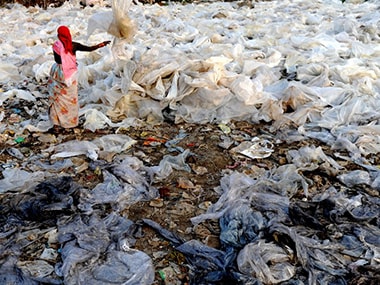Mumbai: A study by an international NGO has revealed that packaging of branded edible items is responsible for generating a huge chunk of non-recyclable plastic waste in the country. [caption id=“attachment_3832743” align=“alignleft” width=“380”]  Representational image. AFP.[/caption] Global Alliance for Incinerator Alternative (GAIA) conducted a 15-city audit and released its report in May. It revealed that the biggest polluter is branded, single-use plastic used in fast-moving consumer goods (FMCG), which accounts for 26.8 percent of all plastic waste. Waste was collected from 250 sites: Households, ecologically fragile zones such as beaches and rivers, as well as mountainous regions. The study found that as much as 48 percent of India’s plastic waste consists of multilayer packaging, which cannot be recycled. Almost 90 percent of plastic packaging is used to wrap food. Multilayer packaging is typically used for edible items such as chips, chocolates and other snacks. These items of packaging are not collected by waste pickers as they have no recyclable value. “Irresponsible human behaviour such as littering and inadequate collection and handling systems in the developing countries are touted as the reasons,” said Pratibha Sharma, national coordinator of GAIA India. “However, our waste-and-brand audit results from India, Indonesia, and the Philippines have underscored the central role that multinational companies play in perpetuating the plastic-pollution crisis.” “We believe that the crisis is spawned primarily by corporate practices and strategies, which keep pushing single-use disposables and low-value plastic packaging onto consumers to improve their profit margins,” she added. According to the NGO’s findings, Parle, Britannia, Amul and ITC are the top four polluters in India while PepsiCo, Perfetti van Melle, Hindustan Unilever and Coca Cola are their multinational equivalents. All India Plastic Manufacturers’ Association declined to comment on the study. Parle and Amul did not respond either but Britannia promised to. A spokesperson from PepsiCo said they can’t comment on the GAIA survey as they haven’t gone through it. However, she cited the company’s commitment to have all its packaging be recoverable or recyclable by 2025 and to support increased recycling of plastic waste. She informed that towards this end, PepsiCo will start using 100 percent compostable, plant-based packaging for two of its most popular products this year. Shifting goalposts Harshad Barde, a member of waste pickers collective SWaCH in Pune, explained that all non-recyclable plastic was to be phased out in two years under the Plastic Waste Management Rules, 2016. “But merely 20 days before the end of that period, it was amended to say that only non-recyclable plastic that is non-energy recoverable or without any alternate use is to be phased out in two years. This rendered the phase-out pointless as most multi-layer plastic is energy recoverable.” SWaCH was responsible for the brand audit in Pune, where it found that 52 percent of the branded plastic in the city was multi-layer packaging. Proposed solutions To resolve the plastic crisis, the groups that conducted the brand audit have demanded implementation of a “comprehensive Extended Producer Responsibility (EPR) policy that will clearly identify accountability and responsibility all through the life of a product”. They also suggested ways of doing it: Product take-back schemes, pay as you throw or waste-users’ fees, advance-disposal fees, deposit-refund schemes, and recycling and composting incentives. “While we recognise that addressing plastic pollution requires all stakeholders to take responsibility, the companies have maximum influence on how their product is designed, packaged, delivered, consumed and discarded,” said Sharma. “Their role in preventing or perpetuating plastic pollution is indisputable.” She added that the Pune and Trivandrum municipal corporations have already taken cognisance of the findings and declared their intentions to meet the companies in their cities for implementation of EPR. President of the Maharashtra Plastic Manufacturers Association, Ravi Jashnani, agrees that manufacturers should embrace EPR. He also believes the government should think of alternative materials for packaging. Mukta Tilak, mayor of Pune, said they will explore penalties for sellers of such plastic, and also investigate how plastic waste can be taken back from the consumers. She adds that the PMC will ensure that more degradable plastic is used. Multiple organisations have started working on alternatives to plastics. eCoexist in Pune is one. “The development of alternatives has four aspects: The material, the product, the transportation, and pattern of usage,” said eCoexist founder Manisha Gutman over email. Of these, the material and product design is in the hands of professionals and the industry.” “However, the third aspect of consumption pattern and habits lies in the hands of consumers themselves to a certain degree,” she added. “While we wait for materials scientists and product designers to create new alternatives, we can look back at traditional ways of food packaging before the advent of plastic: This will involve a closer look at what how and when we eat, i.e., at our food itself.” Some products such as plastic straws can be done away with altogether and we can simply start drinking from cups as we used to, said Gutman. “Plastic cutlery is now being replaced by edible cutlery as well as paper- and sugarcane-bagasse cutlery. Stores in earlier times asked you to bring your own utensils to carry grains and oils, and this can be revived,” she added. A paper released by United Nations Environment Programme on World Environment Day (5 June), whose theme this year was Beat Plastic Pollution, said that the aim should be to reduce society’s dependence on the unnecessary use of plastics, especially those made from fossil-fuel sources. The paper, ‘Single-use Plastics: A roadmap for Sustainability’, advised the use of natural polymers; biomass-based, compostable, synthetic biopolymers; and reusable, durable, non-plastic materials. The author is a Pune-based freelance writer and a member of 101Reporters.com_, a pan-India network of grassroots reporters._
A study by an international NGO has revealed that packaging of branded edible items is responsible for generating a huge chunk of non-recyclable plastic waste in the country.
Advertisement
End of Article


)

)
)
)
)
)
)
)
)



